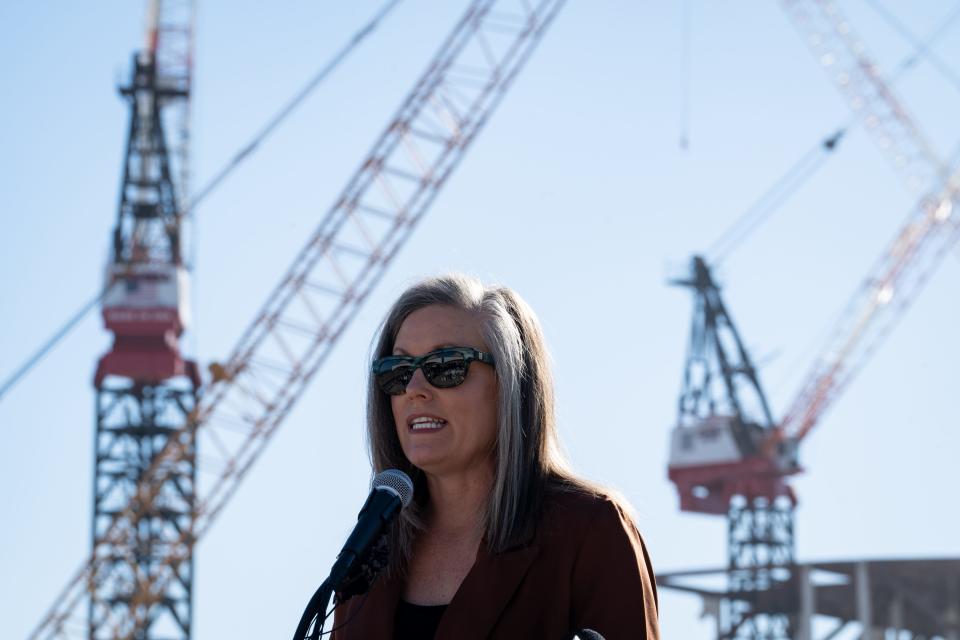State Supreme Court to reconsider 1864 law ordering prison time for abortion providers
The Arizona Supreme Court is opening the door for a possible return of the state's strict 19th-century anti-abortion law that mandates prison time for abortion providers.
The state's highest court decided in an Aug. 22 order to take up a review of the Arizona Court of Appeals decision that blocked the pre-statehood abortion ban.
The court released the decision Wednesday, offering lawyers and observers of the case the chance to submit supplemental and amicus briefs in the next few weeks. A date for oral argument in the case hasn't been announced.
In December, the state Court of Appeals decided to keep the old law on hold and confirmed that a newer law was in effect allowing legal abortions up until the 15th week of gestation.
Legal abortions would effectively end in Arizona if a majority of seven Supreme Court justices reverses that decision and revives the pre-statehood ban, which mandates two to five years in prison for anyone providing an abortion.
Alliance Defending Freedom, the conservative legal group representing Arizona's abortion foes in the case, is fighting to make sure that happens.
"Arizona women deserve the dignity and respect that comes from receiving life-affirming health care and support —not the abortion industry’s false choice between doing what’s best for the mother and protecting the life of her child," said Denise Harle, director of the group's "Center for Life" division, in a written statement.
"We urge the Arizona Supreme Court to allow the state’s pro-life law to take effect and protect the lives of countless innocent, unborn children.”
Planned Parenthood, by contrast, criticized the old law as "cruel, harmful and unpopular with the majority of Arizonans" and predicted the state Supreme Court would not resurrect it.
Kelley Dupps, Planned Parenthood's senior director of public policy and government relations, used the fresh order to promote a plan by advocates to pass a ballot measure legalizing abortion in 2024.
"We recognize this case will not be the last attempt by anti-abortion activists to roll back rights," Dupps said in a prepared statement. "Arizonans deserve the freedom to make their own decisions about their reproductive health, and it is time to secure the right to an abortion in the Arizona Constitution."
Democratic Gov. Katie Hobbs mentioned in her own statement about the order that she's fought "to protect access to safe and legal abortion for all Arizonans" and cited an executive order she issued in June to limit abortion-related prosecutions.
“Enforcing an archaic law that strips Arizonans of their reproductive freedom and threatens to jail women and doctors would be an unconscionable attack on the liberties Arizonans hold dear," Hobbs said. "As I have said time and time again, the right to make decisions about your own family should not be infringed upon."
The development comes more than a year after Arizona's abortion rights were thrown into doubt by the U.S. Supreme Court decision in Mississippi's Dobbs vs. Jackson Women's Health Organization case, which overturned Roe v. Wade.

Arizona's First Territorial Legislature codified the abortion ban in 1864, also mandating a year in prison for a woman obtaining an abortion in a provision repealed in 2021.
When the U.S. Supreme Court made its Roe v. Wade decision in 1973 granting women national abortion rights, Arizona's strict ban was rendered dormant by a court injunction. But anti-abortion conservatives quickly took action when the Dobbs decision allowed states to once again control abortion laws.
In September, former Republican Arizona Attorney General Mark Brnovich convinced a Pima County Superior Court judge to lift the injunction on the old law that had been in place since 1973. A three-member panel of the state Court of Appeals southern district reversed the decision three months later, allowing abortions to continue in the state.
The panel agreed with abortion advocates who argued that the provisions of the 15-week law and 1864 ban could be "harmonized" for both to remain in effect. The decision means the 1864 law ban on providing abortions currently only applies to unlicensed non-physicians.
Kris Mayes, the Democratic attorney general elected in November, chose not to continue Brnovich's effort to reinstate the pre-statehood law, but it remains active since Yavapai County Attorney Dennis McGrane was approved as an intervenor in the case. McGrane didn't return a call requesting comment.
Mayes, who has said she wouldn't enforce anti-abortion laws, asked the state Supreme Court Wednesday to affirm the appeals court's December decision.
"While the 15-week ban is far from an ideal status quo, lacking crucial exceptions for rape or incest, it is much preferable to a law passed during the Civil War, before Arizona was a state, and decades before women gained the right to vote," Maye said in a statement.
Reach the reporter at rstern@arizonarepublic.com or 480-276-3237. Follow him on Twitter @raystern.
This article originally appeared on Arizona Republic: Arizona Supreme Court to decide whether to reinstate 1864 abortion ban

